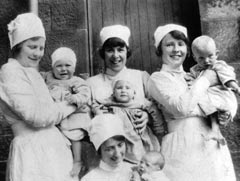Nursing
In the 60th Anniversary of the National Health Service, Scotland has, sadly, earned the reputation as 'the sick man of Europe'. The reasons for the nickname may be complex, but one thing is evident: nurses are on the front line, dealing with the 'sick man' in all its guises.
Nurses were amongst the first to foresee the positive impact of the NHS in its initial development. Working in parts of Scotland beset by poverty and economic hardship, nurses saw first hand the affects of war, illness and disease on communities unable to pay for much needed medical services, and welcomed the NHS.
The vision of making healthcare available for all was welcomed by nurses, but their enthusiasm for the new health service weakened their bargaining position in negotiations with the Minister for Health. Unlike the medical profession, whose acceptance of the NHS had to be negotiated, the role of nurses was taken for granted.
Whereas doctors leveraged a strong position for themselves, nurses, by supporting the aims of the NHS, found their ability to influence decisions eroded – a reflection both of the generally lower economic status of women in society and the perception of nurses as 'handmaidens' to the medical profession.
Nurses struggled to make their voice heard in the new health service. It was not until the introduction of consensus management in the 1970s that nurse managers regained the influence of the pre-NHS matrons. However, in the 1980s the application of general management principles to the NHS once again removed the voice of nursing from policy decision making, leading many experienced nurses to leave the profession.
During the next decade, as the healthcare system became more focused on patient experience and patient outcomes, the important role nurses play in delivering high-quality care received greater recognition, resulting in increased opportunities for nurses to influence and be involved in decision making processes.
Nurses, as primary point of contact for patients and trusted as advocates for their care, are now in a greater position than ever to influence and lead as well as promote new innovations in healthcare. Nurses have pushed the boundaries of nursing – leading and developing services, while ensuring that caring remains at the core.
The need for innovation is just as great today as in 1948: studies show us that it is still those living in the most economically deprived areas that have the greatest risk of ill health.
To tackle our nation's health problems, particularly health inequalities, the first step for all those working within the health sector is to learn from the past 60 years and to recognise and value each other's contribution to the health and healthcare agenda for the benefit of patients and public alike.
Ultimately, one of the greatest legacies nurses have brought to the NHS is the ability to constantly embrace change, whilst responding to individual patient needs and championing these in partnership with the wider community and health and social care organisations.
Theresa Fyffe
Director, RCN Scotland
- Further information
- Royal College of Nursing

